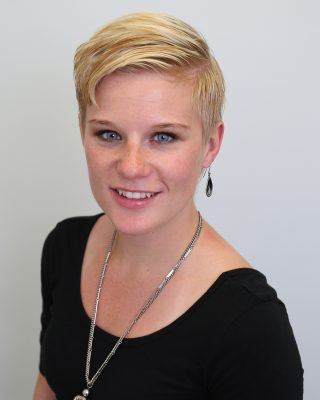Academics meets psychedelics in Honors grad's research
by Joey Besl |

Her neuroscience research career has brought her big-name accolades and several extra passport stamps. This April, Dr. Candace Lewis '09 returned to her alma mater for a speech on psychedelics and depression. (Photo courtesy Candace Lewis)
Fitting for someone who studies psychedelics, the academic achievements of Candace Lewis '09 are pretty mind-blowing.
Since graduating from UAA, she has earned a doctorate in behavioral neuroscience, presented at international conferences, published on environment and gene interactions, researched at a landmark Swiss hospital, and now teaches neuroscience at the largest university in the country. All before turning 30, and all from someone who admits college was barely on her radar until junior year of high school.
Her higher education journey started at UAA. It was here where professors mentored her earliest research. It was here where a Truman Scholarship flyer caught her eye in the Honors College, and where faculty guidance opened the next opportunity (her mentor, Dr. James Mueller, helped her secure the university's nomination for the Truman, a $30,000 federal prize awarded to college juniors with the greatest public service potential).
The Truman Scholarship - one of just 64 awarded nationwide - allowed her to pursue graduate school in Arizona, and she hasn't slowed down since.
Now a postdoctoral researcher, she returned to UAA April 19 to present the antidepressant potential of magic mushrooms.
"Genetic mood lighting"
2015 was a big year for Candace. She earned her Ph.D. in behavioral neuroscience from Arizona State University in June, followed by a $200,000 (!) Bisgrove Fellowship from Science Foundation Arizona to complete postdoc work with Phoenix's Translational Genomics Research Institute (TGen). A few months later, in September, she began a Fulbright fellowship at University Hospital of Psychiatry in Zurich, where famed psychologist Carl Jung worked (Albert Hoffman - LSD research pioneer - also started his career in Zurich).
Her Bisgrove and Fulbright projects are completely separate, though all her work stems from an interest in the interaction between experiences and neurobiology and how that shapes mental health.
At TGen, Candace studies epigenetics, or how genes are differentially expressed across an organism. Since the 1940s, she said, scientists have understood how genes are turned "on" or "off" (for example, our liver, heart and brain have the same genes, but vastly different cells) and now know that the epigenetic code is dynamic. Candace works with identical twins, researching how their individual experiences can epigenetically affect their brain and behavior.
She refers to this variability in neural gene expression as a light dimmer - certain genes express brighter in one twin over the other. "Identical twins have the same DNA sequence, but the epigenetics are the light dimmers," she explained (she jokingly refers to her research as "genetic mood lighting.")
"The genes that are expressed in neural tissue we now know are responsive to our experiences, and we can turn that gene up or down," she continued. "Those genes are implicated in mood disorders."
Of Phish fans and pharmacists
Her other project, and the one she'll share at UAA, comes from her Fulbright experience. In Switzerland, she studied the effects of the compound psilocybin, which gives certain mushrooms psychedelic properties.
Though known more for trippy side effects, psilocybin can possibly benefit depression treatment too. If proven, psychedelics could grow as accepted among pharmacists as they are with Phish fans.
"300 million people experience depression," said Candace, citing a figure from the World Health Organization. Mushrooms, she thinks, may be the trick to better treatment.
"Our current pharmaceutical options for a wide range of psychiatric disorders is just lacking," she said. Since the 1950s, doctors have prescribed pills in vast numbers, with frequent dosages, that take significant time to reduce symptoms and, importantly, have their own litany of adverse side effects.
"This model [treatment with psilocybin] has the potential to be better. It's rapid onset and it doesn't require daily dosing.
"There are those who have found adequate treatments for depression, and then there are a large percentage of people who haven't," she continued. "I just think we could try better."

Switzerland isn't just for science. Here, Candace fits in a hike in the Alps during her Fulbright year in Zurich. (Photo courtesy Candace Lewis)
Honored by the Honors College
Candace's UAA presentation served as keynote for both the Undergraduate Research and Discovery Symposium and the Behavioral Sciences Conference of the North.
Jointly sponsored by the Department of Psychology and the Honors College, her talk covered the history of psychedelics around the world and its reintroduction into modern society. She discussed her clinical work, what she learned in Zurich, and her proposed future research (along with its potentials).
That doesn't leave much time to talk about UAA, though she has thoughts on the matter.
"[From] where I'm at in my career now, I look back on how great my education was at UAA and I'm so appreciative," she said. "The professors I had in the psychology department were so good, and that's what really developed my love for psychology and neuroscience and drove me to go on to grad school."
It's been an unlikely path to doctoral work. Prior to UAA, she knew very few people with a bachelor's degree, and wasn't even sure what separated a master's and a doctorate. Now, she has all three.
So what's it like to return to UAA as Dr. Lewis, world-traveling researcher? "It's just such a huge honor. It's amazing to be invited to do this talk," she said.
"And kind of really unbelievable," she added with a laugh.
 "Academics meets psychedelics in Honors grad's research" is licensed under a Creative Commons Attribution-NonCommercial 4.0 International License.
"Academics meets psychedelics in Honors grad's research" is licensed under a Creative Commons Attribution-NonCommercial 4.0 International License.














